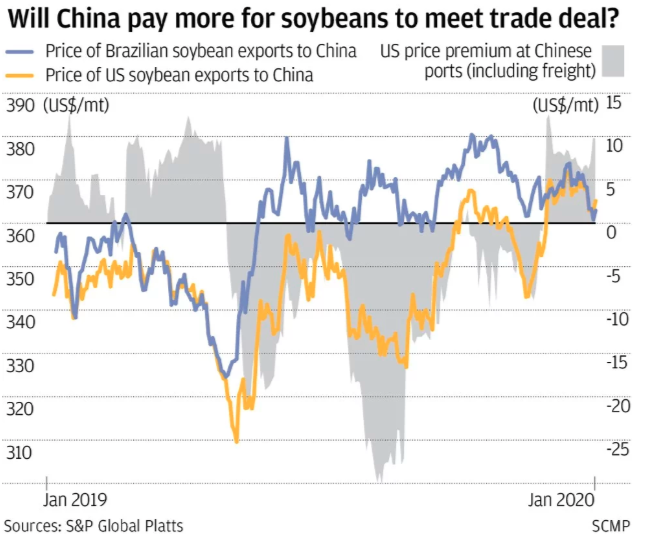Phase One Trade Deal “Doomed From The Start” As Skepticism Mounts About Purchases
President Trump is at the World Economic Forum in Davos, Switzerland, on Tuesday, giving a speech to the world’s elites on how the Phase 1 trade agreement is the greatest deal ever.
Trump has touted non-stop on Twitter about how he made the biggest deal in the world, and China will be purchasing vast quantities of U.S. farm products in the coming months.
After all, it’s an election year, and Trump has to cheerlead, even as skepticism is growing over China’s capacity to buy U.S. products, reported South China Morning Post (SCMP).
China’s commitment to purchase an additional $200 billion of U.S. goods over the next several years “may be doomed from the start.”
Chad Bown, a trade specialist at the Peterson Institute for International Economics (PIIE), said, “a close look at the data shows that the numbers are even more unrealistic than first believed. Even worse, hostilities might renew, leading to a re-escalation of trade tensions currently on hold.”
Much of the skepticism of trade purchases by China is from their repeated statements on how import purchases from the deal will be based on market conditions. This was reiterated by Li Xingqian, head of the foreign trade department, on Tuesday, who said, “we will expand imports from the United States based on the principles of the market and World Trade Organization rules and will not affect imports from other countries.”
Much of the demand will be based on China’s economy, and with growth slumping to three-decade lows in 2019 – a surge in demand for U.S. products will be challenging for Chinese importers.
China’s State Grid, the largest utility company in the country, warned that economic growth could plunge to 4% within the next four years, according to internal forecasts.
Andrei Agapi, associate pricing director for agriculture at S&P Global Platts in Singapore, told the SCMP that if “China says it’s down to market conditions, then the U.S. will have to be competitive. And the reality is that the U.S. is not competitive by a long shot already, and it hasn’t been before either.”
Agapi said since China offered tariff waivers on U.S. soybeans imports last fall, the price has risen past Brazilian beans, which would entice the Chinese to ditch U.S. markets for ones in Latin America because of cost factors.
We’ve noted how China has been actively diversifying farm purchases away from the U.S. towards Brazil and Argentina.
Peter Meyer, head of grain and oilseed analytics at S&P Global Platts, said when we spoke with Chinese bean traders in the interior of the country, there’s pessimism developing that “there is no way they could even run that much in the country – it would throw the entire domestic supply chain into disarray.”
Traders told SCMP that if China had to bite the bullet and buy U.S. farm goods despite market conditions – then it would do so via state trading companies like COFCO.
Agapi said China has already purchased 50% of its soybean demand for the year from Latin America. Furthermore, he said demand this year will be lower because the African swine fever wiped out at least half of the country’s pig herd.
Andrew Tilton, Goldman Sachs’ chief economist for Asia-Pacific, said Tuesday that “it would obviously take political will and maybe some easing of import restrictions in a couple of areas”.
“The surprise for us in the official document was that the amount on the agriculture side is less and the energy side was more. That might be relevant because there were a couple of sectors where orders would count as purchases. There are often long-term energy contracts that are signed, but it’s less typical in the agricultural space to see that,” Tilton said.
Bown said 28% of U.S. exports to China are part of industries not covered by the new trade agreement, and this could mean these exports are slashed while sourced from other countries.
“Thus, in legal terms, China has little incentive to import those US$51.6 billion of uncovered products from the U.S. in 2020 or 2021,” he said.
Bown warned: “To compensate angry trading partners aggrieved because of the trade diversion, China could purchase more uncovered products from them and reduce imports from the United States. That would be painful for American companies and workers whose products Trump has chosen not to put into this agreement.”
More or less, the trade agreement will likely be broken after the election, and the trade war will resume.
China to Expand Imports From U.S. Based on Market Demand: Mofcom
So the entire trade deal is meaningless
— zerohedge (@zerohedge) January 21, 2020
Tyler Durden
Tue, 01/21/2020 – 19:05
via ZeroHedge News https://ift.tt/2sHXuqu Tyler Durden
